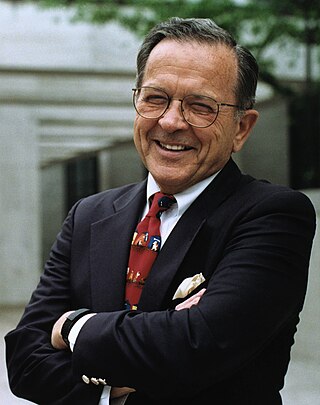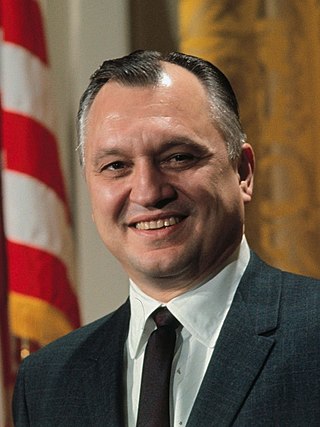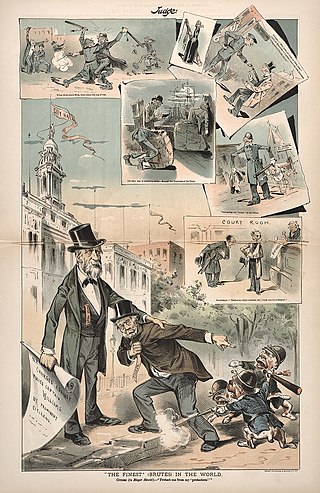Related Research Articles

Theodore Fulton Stevens Sr. was an American politician and lawyer who served as a U.S. Senator from Alaska from 1968 to 2009. He was the longest-serving Republican Senator in history at the time he left office. Stevens was the president pro tempore of the United States Senate in the 108th and 109th Congresses from 2003 to 2007, and was the third U.S. Senator to hold the title of president pro tempore emeritus. He was previously Solicitor of the Interior Department from 1960 to 1961. Stevens has been described as one of the most powerful members of Congress and as the most powerful member of Congress from the Northwestern United States.

Walter Joseph Hickel was an American businessman, real estate developer, and politician who served as the second governor of Alaska from 1966 to 1969 and 1990 to 1994, as well as U.S. Secretary of the Interior from 1969 to 1970. He worked as a construction worker and eventually became a construction company operator during Alaska's territorial days. Following World War II, Hickel became heavily involved with real estate development, building residential subdivisions, shopping centers and hotels. Hickel entered politics in the 1950s during Alaska's battle for statehood and remained politically active for the rest of his life.

Cornell Companies (NYSE:CRN) was an American corporation that operated correctional facilities, contracting them to state and local governments. The company's headquarters were located in Houston, Texas. On August 12, 2010, Cornell was acquired by the GEO Group.
Operation G-Sting, also called Strippergate, and referencing the G-String costume often worn by strippers and showgirls, was an FBI investigation into bribes and unreported campaign contributions taken by Clark County Commissioners in Clark County, Nevada and city council members in San Diego, California. These bribes were from the same lobbyist, representing two sets of strip clubs, and was the result of strip club owners Rick Rizzolo and Mike Galardi trying to remove local "no touch" laws affecting the girls in their clubs.
VECO Corporation was an American oil pipeline service and construction company until its purchase in September 2007 by CH2M Hill. As of that date, the VECO Corporation ceased to exist. Founded in 1968 as Veltri Enterprises by Wayne Ray Veltri, renamed VE Construction after being bought in 1970 by Bill Allen and in 1979 changed to VECO Corp. The company grew to become a major player in the Alaskan oil industries' support. VECO also was a worldwide player in the oil industry, having divisions in many major oil markets.
Benjamin Aavan Stevens was an American politician and political advisor who served as the Chief of Staff to the Governor of Alaska, Mike Dunleavy. He previously served as the President of the Alaska State Senate as a member of the Republican Party. Stevens was the son of the late United States Senator Ted Stevens, who represented Alaska from 1968 to 2009.
The Alaska political corruption probe refers to a 2003 to 2010 widespread investigation by the Public Integrity Section of the U.S. Department of Justice, the Federal Bureau of Investigation, and the Internal Revenue Service into political corruption of nine then-current or former Alaskan state lawmakers, as well as Republican US Representative Don Young and then-US Senator, Republican Ted Stevens. Sometimes referred to as "The Corrupt Bastards Club" or the "Operation Polar Pen", the investigation focused on the oil industry, fisheries and for-profit prison industries.

Ronald Steven Calderon is a former Democratic California State Senator from the 30th Senate District. Calderon is also known for receiving bribes from Michael Drobot.

William James Allen was an American businessman who was the CEO of the Alaska oilfield services company VECO Corporation. VECO was an Alaska-based oil pipeline service and construction company founded by Wayne Veltri. Bill Allen was born in Socorro, New Mexico, and at the age of 16 left for the oil fields of Alaska to become a welder to help support his family. VECO began as a one-truck welding and repair operation that grew to become a major player in the Alaskan and worldwide oil industries' support services business. He built a for-profit prison in Barbados as well. VECO also was a worldwide player in the oil industry, having divisions in many major oil markets, including Sudan, Russia, Mexico, Venezuela, and Syria. VECO had a major impact on the economy of Alaska and employed over 5,000 people worldwide. Allen was later prosecuted for sexually assaulting minors, a crime he had been protected from prior after lying under oath during Ted Stevens's corruption trial, costing the Senator re-election in 2008.
Anthony Cobos is an American politician from the State of Texas in the United States. He served as the El Paso County Judge from 2007 to 2011 and is a former member of the El Paso City Council. El Paso County, Texas, is located on the border of the United States and Mexico.
Thomas T. Anderson was a partner at Optima Public Relations in Anchorage, Alaska and host of the "Tom Anderson Show" radio talk show (www.TomAndersonShow.com) on KVNT 92.5 FM and 1020 AM in Anchorage and Mat-Su. Anderson, a Republican, was an Alaska state representative for District 19 representing northeast Anchorage for two terms, from 2003 to 2007. He became known for his sponsorship of legislation which expanded Alaska's DNA database to assist in forensic identification of criminal suspects through DNA testing.
Victor H. Kohring was an American politician who was a member of the Alaska House of Representatives.
Matthew Louis Guglielmetti Jr., also known as "Matty", is the underboss or sottocapo of the New England-based Patriarca crime family of La Cosa Nostra. Guglielmetti is closely aligned with former family boss Luigi Mannochio.
The Alaska Public Safety Commissioner dismissal, also known as Troopergate, involves the possibly illegal July 2008 dismissal of the Alaskan Public Safety Commissioner Walt Monegan by Republican Governor Sarah Palin. A complaint alleged that Palin dismissed Monegan because he did not fire Alaskan State Trooper Mike Wooten, who was in a bitter divorce with Palin's sister, Molly McCann.

Walter Carleton Monegan III is an American politician and the former Police Chief of Anchorage, Alaska, and later Commissioner of Public Safety for the state of Alaska. His dismissal in July 2008 by Alaska governor Sarah Palin drew considerable attention, particularly in the wake of Palin's selection as the Vice-Presidential nominee of the Republican Party the following month. Monegan accused Palin of not telling the truth about the reasons for his dismissal.

Throughout the history of the New York City Police Department, numerous instances of corruption, misconduct, and other allegations of such, have occurred. Over 12,000 cases have resulted in lawsuit settlements totaling over $400 million during a five-year period ending in 2014. In 2019, misconduct lawsuits cost the taxpayer $68,688,423, a 76 percent increase over the previous year, including about $10 million paid out to two exonerated individuals who had been falsely convicted and imprisoned.

Louis Mead Treadwell II is an American businessman and politician who served as the 11th lieutenant governor of Alaska from 2010 to 2014. Treadwell also served as chair of the United States Arctic Research Commission from 2006 to 2010. He is a member of the Republican Party and was a candidate for the 2014 U.S. Senate election in Alaska.
Jerry Ward is an American politician and businessman.

On January 6, 2017, a mass shooting occurred at Fort Lauderdale–Hollywood International Airport in Broward County, Florida, United States, near the baggage claim in Terminal 2. Five people were killed while six others were injured in the shooting. About 36 people sustained injuries in the ensuing panic. Esteban Santiago-Ruiz, who flew in to the airport from Alaska and committed the shooting with a Walther PPS 9mm semi-automatic pistol, was taken into custody by a Broward County Sheriff's Office (BSO) deputy within 85 seconds after he started shooting. The shooting from start to finish lasted 70–80 seconds. Santiago was later diagnosed with schizophrenia and pleaded guilty to avoid possible execution. On August 17, 2018, Santiago was sentenced to five consecutive life sentences plus 120 years in prison.

United States v. Senator Theodore F. Stevens was a criminal trial spanning from 2007 to 2009 of long-time U.S. Senator Ted Stevens as part of the Alaska political corruption probe. Stevens was the main source of coverage of the probe, being indicted by a jury on July 29, 2008 and convicted on 7 felony charges of corruption on October 27, 2008 which cost him re-election in the Senate race a week later.
References
- ↑ State of Alaska Office of the Governor No. 92-201 09/23/92
- ↑ Anchorage Daily News (ADN) Editorial 02/01/94; Anchorage Daily News (ADN) Editorial 08/28/94
- ↑ FBI said to have paid witness $200,000 during corruption probe, Alaska Dispatch News , Lisa Demer, March 23, 2010. Retrieved 8 June 2016.
- ↑ Alaska corruption trial sent to jury Archived 2017-09-17 at the Wayback Machine , Juneau Empire , July 9, 2007. Retrieved September 17, 2017.
- ↑ Fairbanks News-Miner 11/08/02
- ↑ Anchorage Daily News 07/03/07
- ↑ , United States Department of Justice , July 9, 2007. Retrieved September 19, 2013.
- ↑ Alaska State Senator indicted on public corruption, Anchorage Daily News, October 6, 2007. Retrieved September 19, 2020.
- ↑ James Franklin Prewitt, Anchorage Daily News , September 13, 2020. Retrieved September 18, 2020.